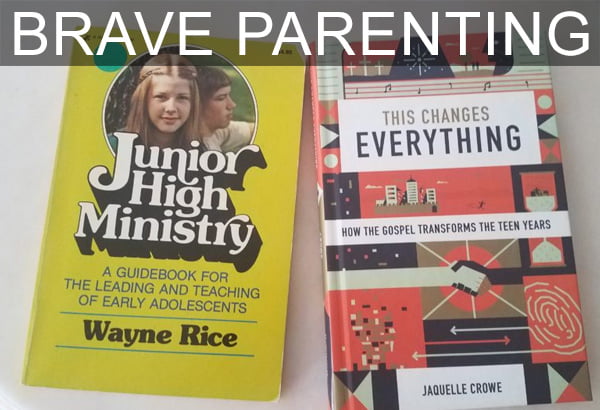What a Teen’s Faith Looks Like

- Faith is in transition.
- Faith includes doubt and disbelief.
- Faith is personal.
- Faith includes feelings.
- Teens have trouble living their faith.
- Faith includes failure.
- Faith is idealistic.
- Faith needs models.
Since I’ve been in youth ministry I’ve gone through Generation X, Millennials, and now Gen Z. Because marketers love getting their hands on the money of consumers in their teen years, I’ve read and read and read all about these generation groups. I’m fascinated with these studies mostly because I’m fascinated by teens. Our world hinges on them. God loves them. Can our teens’ faith change this world? I believe so. Otherwise I still wouldn’t be a youth minister.
The research is now coming in on Gen Z. (They are now at the age for marketers to try to get their money too.) The research is showing that this is a very different generation in so many ways.
(Note: All generations have done that arm motion of trying to get truckers to honk their horn. Some things about teens never change.)
In my reading, studying, and praying for discernment about Gen Z (with my current group of teens) I felt led to re-read the first youth ministry book I ever read. It was assigned to me in my first ever youth ministry college class which was a new program back in 1983. I loved this book. It put words to what I was already experiencing as a youth leader at my church. This book was Junior High Ministry by Wayne Rice, published in 1978.
The re-read was worth my time. It was good for me to remember why I love youth ministry so. It was good for me to remember the reasons for youth ministry. This was written back in a time when most churches were just talking about church youth ministry hence why the book was written. It was also good for me to remember the simple good of youth ministry. Youth ministry has gone far astray from these early thoughts. You could say that this is all a process of growth but I have other strong opinions as to the wrong direction of youth ministry. I’ll save those thoughts for another article I am sure to write.
I circle back to these “new” ideas from 1978 to bring you this list of what a junior higher’s faith looks like. But this is not just about those ages 12 to 14. Teens have gotten younger and older in their development over these 40 years. We’ve replaced junior high schools with middle schools. We’ve got tweens now. We’ve got young adults who are no more responsible than teens. Yet this list is still applicable for our teens today. I could have just given the list to you without the back story but somehow the back story also confirms the list.
- Faith is in transition. Everything about adolescence is in transition. So, of course, their faith is too. No one’s faith is really a one-time decision anyway. Take the “ride” with your teen on this adventurous transition of faith. Hopefully you will provide loads of spiritual memories to make it an adventurous transition.
- Faith includes doubt and disbelief. Who’s faith doesn’t? But it is all the more true during this transition. Read more about how to handle your teen’s doubt here. The Doubting Faith
- Faith is personal. With the teen’s newly acquired thinking abilities (natural part of adolescent development), they want to make their own decision about things in their lives and this includes their faith. Because their faith is in transition, this has all sorts of appearances. Sometimes this is all out rejection of your faith. Sometimes this is a more passionate and demonstrative faith than yours. Whichever swing of the pendulum their faith grows to, it is most often a reflection of your faith—whether you have intentionally passed on your faith or not. You are the mirror for identity in your teen’s life. That is your role as a parent.
- Faith includes feelings. Part of adolescent development is experiencing adult-like emotions and feelings for the first time. Because these emotions are new, they are also intense and unpredictable. You know this already, don’t you? You are living with this very emotional creature. The good news is these emotions will stabilize as they grow. This is also important to know—these early emotional experiences are formative. This is why it is so important for teens to have good emotional memories of their faith–for them to “feel” God’s presence and to “feel” their place in this world of faith. The more good memories teens have about faith, the more likely they will take their faith into adulthood despite all of the troubles and doubts that come with a growing life of responsibility.
- Teens have trouble living their faith. Rare is the teen who will carry his/her Bible to school and lead that campus ministry. I know. I’ve been praying for more of these teens my entire youth ministry life. Part of adolescence is this separation of living two different lives. They love God with their whole hearts while with others who do. And they love their compromising friends more than they love God while they are with them. Teens have no problem switching in and out of these very different worlds because to them it is all figuring out who they are. The comprehension of this hypocrisy does come with maturity. You are blessed to be raising these awesome and immature teen creatures who will scare and annoy you many times.
- Faith includes failure. Actually adolescence is full of failure. Failure is survivable and helps grow grit. But who is teaching teens that all of us fail at faith at times? They see us loving adults who have “made it” and then they know their secret lives and they compare and are far from us in comparison. So the failure gets internalized like God doesn’t love them or they are not worthy of God’s love. But we all fail at times, right? The only reason we fail less is because we are more mature. So let them in on the secret of how failure is survivable and helps grow you.
- Faith is idealistic. Yes, this is a paradox. In the midst of struggle, failure and doubt, teens are also idealistic. They have a strong desire to be committed to something so that their lives count. So that they are known. So that they know they will not grow up and be alone and a loser. Use this idealism for God’s good. If you do, they will take this identity with them into adulthood because this is the story they want told about their lives.
- Faith needs models. One not-talked-about-enough need of adolescent development is the desire for adult friends who are willing to lead them and guide them across the bridge from childhood to adulthood. The ones who they trust when they hear “you will make it” and “you will be a great adult” and “here’s the right decision” and “here is the way to decide.” Goal: Find your teen 5 adults you both can trust to be in his/her life.
Most teens sure do love roller coasters. Most adults can’t ride roller coasters anymore because of our aging equilibrium or maybe because we have matured. At least some of us. This Bravester truth is one our teens need to know through it all. You are the mirror for this truth. We are cheering you on.







Comments
Trackbacks & Pingbacks
[…] teen has a secret life–it’s a part of adolescent development. The questions that run through that growing brain of […]
[…] purpose is a part of adolescent development. Finding purpose is part of a growing faith, which I hope is happening in your teen’s life. Faith becomes even more real when one’s […]
[…] What a Teen’s Faith Looks Like […]